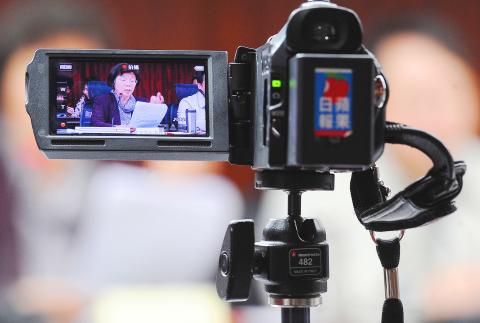Academics and representatives of various non-governmental organizations (NGOs) yesterday voiced their worries about the buyout of Next Media Group’s (壹傳媒集團) Taiwanese operations, urging the Fair Trade Commission (FTC) to consider the importance of having diverse voices in the media when reviewing the deal.
At a public hearing organized by the commission yesterday, former FTC commissioner Shih Jun-ji (施俊吉) said the review of the Next Media buyout is the most important case in the commission’s history.
Shih said the commission should spare no effort to prevent buyers from circumventing the law, adding that the Fair Trade Act (公平交易法) stipulates that the commission should not only take into consideration the benefit to the economy as a whole, but also the public interest.

Photo: Chu Pei-hsiung, Taipei Times
In terms of the public interest, the government should create an environment that allows newspapers to produce materials from as many perspectives as possible, while the accuracy of news is also of vital importance, he said.
There is no economic benefit for society from the deal, while the disadvantages that will result from it are that the public will only be given limited perspectives on events in the future, Shih said, adding that there is no reason for the commission to approve the deal.
Association of Taiwan Journalists (ATJ) president Chen Hsiao-yi (陳曉宜) emphasized the unique nature of the media as a means for the public to obtain information. She demanded that the FTC’s commissioners review the case differently from other cases.
Chen said the print media have agenda-setting power for the entire media industry and have often dictated what news is broadcast on local TV stations the following day.
Therefore, because of the influence print media have, it is not sufficient for the commission to make a decision based on market share alone, she said.
Citing a survey conducted by AC Nielsen, Jang Show-ling (鄭秀玲), a professor of economics at National Taiwan University, said Want Want China Times Group’s (旺旺中時集團) share of Taiwan’s media market would exceed 50 percent after the buyout deal goes through.
As Want Want Group has a record of using its media outlets to attack its critics or those who stand in its way, Jang said the disadvantages resulting from the Next Media deal are too significant to be ignored.
Jang became emotional when she said that she had to stay alert on the street because of her involvement in the case.
FTC spokesman Sun Lih-chyun (孫立群) said that the commission would try to incorporate the importance of diverse voices on the media into their review process.
Sun said the information the commission has now suggests that there are two groups of buyers and two contracts. One is related to Next Media’s print media and the other to its electronic media.
The commission has yet to receive a formal submission of the deal, he said.

‘ABUSE OF POWER’: Lee Chun-yi allegedly used a Control Yuan vehicle to transport his dog to a pet grooming salon and take his wife to restaurants, media reports said Control Yuan Secretary-General Lee Chun-yi (李俊俋) resigned on Sunday night, admitting that he had misused a government vehicle, as reported by the media. Control Yuan Vice President Lee Hung-chun (李鴻鈞) yesterday apologized to the public over the issue. The watchdog body would follow up on similar accusations made by the Chinese Nationalist Party (KMT) and would investigate the alleged misuse of government vehicles by three other Control Yuan members: Su Li-chiung (蘇麗瓊), Lin Yu-jung (林郁容) and Wang Jung-chang (王榮璋), Lee Hung-chun said. Lee Chun-yi in a statement apologized for using a Control Yuan vehicle to transport his dog to a

BEIJING’S ‘PAWN’: ‘We, as Chinese, should never forget our roots, history, culture,’ Want Want Holdings general manager Tsai Wang-ting said at a summit in China The Mainland Affairs Council (MAC) yesterday condemned Want Want China Times Media Group (旺旺中時媒體集團) for making comments at the Cross-Strait Chinese Culture Summit that it said have damaged Taiwan’s sovereignty, adding that it would investigate if the group had colluded with China in the matter and contravened cross-strait regulations. The council issued a statement after Want Want Holdings (旺旺集團有限公司) general manager Tsai Wang-ting (蔡旺庭), the third son of the group’s founder, Tsai Eng-meng (蔡衍明), said at the summit last week that the group originated in “Chinese Taiwan,” and has developed and prospered in “the motherland.” “We, as Chinese, should never

‘A SURVIVAL QUESTION’: US officials have been urging the opposition KMT and TPP not to block defense spending, especially the special defense budget, an official said The US plans to ramp up weapons sales to Taiwan to a level exceeding US President Donald Trump’s first term as part of an effort to deter China as it intensifies military pressure on the nation, two US officials said on condition of anonymity. If US arms sales do accelerate, it could ease worries about the extent of Trump’s commitment to Taiwan. It would also add new friction to the tense US-China relationship. The officials said they expect US approvals for weapons sales to Taiwan over the next four years to surpass those in Trump’s first term, with one of them saying

INDO-PACIFIC REGION: Royal Navy ships exercise the right of freedom of navigation, including in the Taiwan Strait and South China Sea, the UK’s Tony Radakin told a summit Freedom of navigation in the Indo-Pacific region is as important as it is in the English Channel, British Chief of the Defence Staff Admiral Tony Radakin said at a summit in Singapore on Saturday. The remark came as the British Royal Navy’s flagship aircraft carrier, the HMS Prince of Wales, is on an eight-month deployment to the Indo-Pacific region as head of an international carrier strike group. “Upholding the UN Convention on the Law of the Sea, and with it, the principles of the freedom of navigation, in this part of the world matters to us just as it matters in the